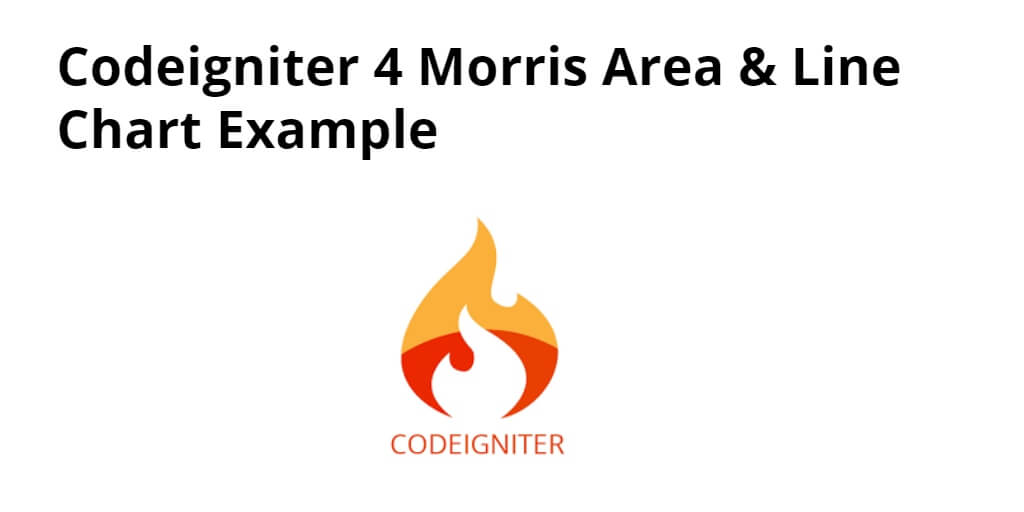Codeigniter 4 morris area and line charts tutorial. In this example tutorial, you will learn how to get month records of date wise from MySQL in codeigniter 4 app and implement morris area chart and line chart in codeigniter 4 app using morris js.
This tutorial will guide you step by step on how to get date wise data of the month from the MySQL database and how to show the data on morris line and area charts with the Codeigniter 4 app.
This tutorial will implement line chart and area chart in Codeigniter 4 app using morris chart js and fetch date wise record of current month from MySQL database. And display it on area and line charts.
How To Create Morris Line and Area Chart In Codeigniter 4 App
By using the following steps, you can create dynamic line and area chart using morris in codeIgniter 4 projects:
- Step 1: Setup Codeigniter 4 Project
- Step 2: Setup Basic Configurations
- Step 3: Create a Table in the Database
- Step 4: Setup Database Credentials
- Step 5: Create a Controller
- Step 6: Create a View
- Step 7: Define Routes
- Step 8: Start Development Server
Step 1: Setup Codeigniter 4 Project
In this step, you will download the latest version of Codeigniter 4, Go to this link https://codeigniter.com/download Download Codeigniter 4 fresh new setup and unzip the setup in your local system xampp/htdocs/ . And change the download folder name “demo”
Step 2: Setup Basic Configurations
Next, you will set some basic configuration on the app/config/app.php file, so let’s go to application/config/config.php and open this file on text editor.
Set Base URL like this
public $baseURL = 'http://localhost:8080'; To public $baseURL = 'http://localhost/demo/';
Step 3: Create a Table in the Database
In this step, you need to create table in database and as well as insert some data for line and area chart in codeiginter 4. So visit your phpmyadmin panel and execute the following sql query in it:
CREATE TABLE users (
id int(11) NOT NULL AUTO_INCREMENT COMMENT 'Primary Key',
name varchar(100) NOT NULL COMMENT 'Name',
email varchar(255) NOT NULL COMMENT 'Email Address',
contact_no varchar(50) NOT NULL COMMENT 'Contact No',
created_at varchar(20) NOT NULL COMMENT 'Created date',
PRIMARY KEY (id)
) ENGINE=InnoDB DEFAULT CHARSET=latin1 COMMENT='datatable demo table' AUTO_INCREMENT=1;
INSERT INTO users (id, name, email, contact_no, created_at) VALUES
(1, 'Team', '[email protected]', '9000000001', '2019-01-01'),
(2, 'Admin', '[email protected]', '9000000002', '2019-01-02'),
(3, 'User', '[email protected]', '9000000003', '2019-01-03'),
(4, 'Editor', '[email protected]', '9000000004', '2019-01-04'),
(5, 'Writer', '[email protected]', '9000000005', '2019-01-05'),
(6, 'Contact', '[email protected]', '9000000006', '2019-01-06'),
(7, 'Manager', '[email protected]', '9000000007', '2019-01-07'),
(8, 'John', '[email protected]', '9000000055', '2019-01-08'),
(9, 'Merry', '[email protected]', '9000000088', '2019-01-09'),
(10, 'Keliv', '[email protected]', '9000550088', '2019-01-10'),
(11, 'Herry', '[email protected]', '9050550088', '2019-01-11'),
(12, 'Mark', '[email protected]', '9050550998', '2019-01-12');
Step 4: Setup Database Credentials
In this step, you need to connect our project to the database. you need to go app/Config/Database.php and open database.php file in text editor. After opening the file in a text editor, you need to set up database credentials in this file like below.
public $default = [ 'DSN' => '', 'hostname' => 'localhost', 'username' => 'root', 'password' => '', 'database' => 'demo', 'DBDriver' => 'MySQLi', 'DBPrefix' => '', 'pConnect' => false, 'DBDebug' => (ENVIRONMENT !== 'production'), 'cacheOn' => false, 'cacheDir' => '', 'charset' => 'utf8', 'DBCollat' => 'utf8_general_ci', 'swapPre' => '', 'encrypt' => false, 'compress' => false, 'strictOn' => false, 'failover' => [], 'port' => 3306, ];
Step 5: Create a Controller
In this step, Visit app/Controllers and create a controller name MorrisChart.php. In this controller, you need to add the following methods into it:
<?php namespace App\Controllers;
use CodeIgniter\Controller;
use CodeIgniter\HTTP\RequestInterface;
class MorrisChart extends Controller
{
public function index() {
$db = \Config\Database::connect();
$builder = $db->table('users');
$query = $builder->query("SELECT DAY(created_at) as y, COUNT(id) as a FROM users WHERE MONTH(created_at) = '" . date('m') . "'
AND YEAR(created_at) = '" . date('Y') . "'
GROUP BY DAY(created_at)");
$data['chart_data'] = $query->getResult();
return view('home',$data);
}
}
Step 6: Create a View
In this step, you need to create one view files name home.php and update the following code into your file:
<head>
<meta charset=utf-8 />
<title>Codeigniter 4 Morris Line and Area Chart Example</title>
<link rel="stylesheet" href="https://maxcdn.bootstrapcdn.com/bootstrap/4.0.0/css/bootstrap.min.css" integrity="sha384-Gn5384xqQ1aoWXA+058RXPxPg6fy4IWvTNh0E263XmFcJlSAwiGgFAW/dAiS6JXm" crossorigin="anonymous">
<script src="https://code.jquery.com/jquery-3.3.1.min.js"></script>
<script src="https://cdnjs.cloudflare.com/ajax/libs/raphael/2.1.2/raphael-min.js"></script>
<script src="https://cdnjs.cloudflare.com/ajax/libs/morris.js/0.5.0/morris.min.js"></script>
</head>
<body>
<h3 class="text-primary text-center">
Morris charts with Codeigniter
</h3>
<div class"row">
<div class="col-sm-12 text-center">
<label class="label label-success">Line Chart</label>
<div id="line-chart" ></div>
</div>
<div class="col-sm-12 text-center">
<label class="label label-success">Area Chart</label>
<div id="area-chart" ></div>
</div>
</div>
</body>
Implement Javascript code
Finally, need to implement javascript code for showing a data on morris line and area chart. Now you update the code on script tag after the closing of body tag.
<script>
var serries = JSON.parse(`<?php echo $chart_data; ?>`);
console.log(serries);
var data = serries,
config = {
data: data,
xkey: 'y',
ykeys: ['a'],
labels: ['Current Month Date Wise Total Registered Users'],
fillOpacity: 0.6,
hideHover: 'auto',
behaveLikeLine: true,
resize: true,
pointFillColors:['#ffffff'],
pointStrokeColors: ['black'],
lineColors:['gray','red']
};
config.element = 'area-chart';
Morris.Area(config);
config.element = 'line-chart';
Morris.Line(config);
</script>
Step 7: Define Routes
In this step, you need to create a route that renders the table into the view, place the following code in app/Config/Routes.php file.
$routes->get('/', 'MorrisChart::index');
Step 8: Start Development Server
In this step, open your terminal and execute the following command to start development sever:
php spark serve
Then, Go to the browser and hit below the URL:
http://localhost:8080
Conclusion
In this codeigniter 4 morris line chart and area chart tutorial, you have successfully fetched the record from a database and display it on the morris line and area charts in codeigniter 4 app.
If you have any questions or thoughts to share, use the comment form below to reach us.
